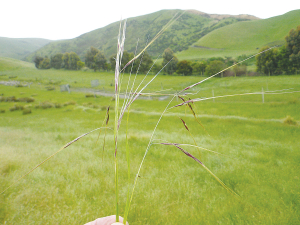Fonterra opens organic milk supply to South Island dairy farmers
South Island dairy farmers will soon be able to supply organic milk to Fonterra.
 Chilean needle grass has sharp penetrating seeds that cause blindness in livestock, pelt and carcass damage – as well as the loss in pasture quality and grazing.
Chilean needle grass has sharp penetrating seeds that cause blindness in livestock, pelt and carcass damage – as well as the loss in pasture quality and grazing.
If nothing was done to stop Chilean needle grass, it could spread through most of New Zealand and eventually cost the country over a billion dollars.
That predication comes following newly published research.
The potential 'sleeper weed' Chilean needle grass (Nassella neesiana) is known to have already taken hold in Hawke's Bay, Canterbury, and Marlborough. It has sharp penetrating seeds that cause blindness in livestock, pelt and carcass damage - as well as the loss in pasture quality and grazing access leading to farm production to take a financial hit.
This weed is one of approximately 22,000 species of introduced plants in New Zealand. The scientific challenge is to identify those that pose an economic or environmental threat before they become widespread.
These sleeper weeds can then be prioritised by authorities – such as regional councils and the Department of Conservation for management to prevent their spread.
“The exciting part is that we now have the ability – through our research – to develop models and tools to identify sleeper weeds,” says AgResearch principal scientist Dr Graeme Bourdôt.
“And predict how and where they will spread in a changing climate and estimate the economic and environmental damage that would result.”
He adds that AgResearch has worked with Manaaki Whenua - Landcare Research on analysing various management scenarios for sleeper pests in general.
“We are currently working with regional councils, DOC and the Ministry of Primary Industries to develop a web-based tool that will enable informed decisions about investing in sleeper weed management programmes”.
The newly published research about Chilean needle grass is in the science journal PLOS One, authored by Bourdôt and AgResearch colleague Dr Chris Buddenhagen. The research combined climate niche modelling (to estimate the potential range of the species in New Zealand) and a spread model (to estimate the future economic losses under a “do nothing” scenario) to determine the benefits of stopping its spread.
Under realistic low and high estimates of this weed’s spread rate, where it takes either 201 or 100 years to reach 90% occupation of its potential climatically suitable range covering 3.96 million hectares, the loss to the pastoral sector is $192 million and $1.16 billion respectively.
These losses would justify annual expenditures to prevent the spread of $5.3m and $34m respectively, the research claims.
“This bio-economic modelling reveals that a nationally coordinated approach to managing Chilean needle grass makes best economic sense,” Buddenhagen says.
“This would include surveillance in susceptible regions and control measures in the infested regions.”
Recent weather events in the Bay of Plenty, Gisborne/Tairawhiti, and Canterbury have been declared a medium-scale adverse event.
DairyNZ's chief executive Campbell Parker says the 2024/25 dairy season reinforces the importance of the dairy sector to New Zealand.
A New Zealand agribusiness helping to turn a long-standing animal welfare and waste issue into a high-value protein stream has won the Australian dairy sector's top innovator award.
OPINION: A bumper season all around.
Dairy Women's Network (DWN) has announced that Taranaki dairy farmer Nicola Bryant will join its Trust Board as an Associate Trustee.
Rural Women New Zealand (RWNZ) says it welcomes the release of a new report into pay equity.

OPINION: A mate of yours truly reckons rural Manawatu families are the latest to suffer under what he calls the…
OPINION: If old Winston Peters thinks building trade relations with new nations, such as India, isn't a necessary investment in…